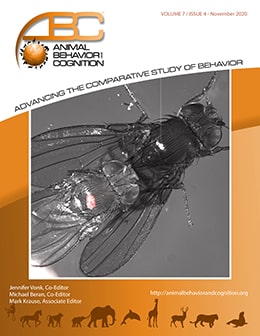Vol 7, Issue 4, November 2020
Perception of Sex Differences in Black-Capped Chickadee (Poecile Atricapillus) Chick-A-Dee Calls
Citation
Campbell, K. A., Hahn, A.H., Congdon, J. V., Scully, E. N., & Sturdy, C. B. (2020). Perception of sex differences in black-capped chickadee (Poecile atricapillus) chick-a-dee calls. Animal Behavior and Cognition, 7(4), 514-530. doi: https://doi.org/10.26451/abc.07.04.04.2020
Abstract
Black-capped chickadee (Poecile atricapillus) chick-a-dee calls differ acoustically depending on flock membership, individual identity, and species identity. Other chickadee vocalizations, including their tseet call and fee-bee song, differ depending on the sex of the signaler. In Experiment 1, we used an operant go/no-go discrimination task to investigate if black-capped chickadees perceive any acoustic differences between male- and female-produced chick-a-dee calls. Manufactured calls that included both male- and female-produced portions were also tested. We conducted a second experiment in which the terminal “-dee” portions of the same chick-a-dee stimuli as used in Experiment 1 were removed. In both experiments, there was no evidence for category learning. Birds did not transfer responding from learned contingencies to untrained stimuli. These results indicate that, while it may be biologically relevant to attend to sex of a signaler in reproductive-critical vocalizations such as the fee-bee song, there may be no benefit for this information to be transmitted in chick-a-dee calls, which are mainly used in situations unrelated to reproduction.
Keywords
Operant conditioning, Songbird, Acoustic perception, Sex differences, Categorization
